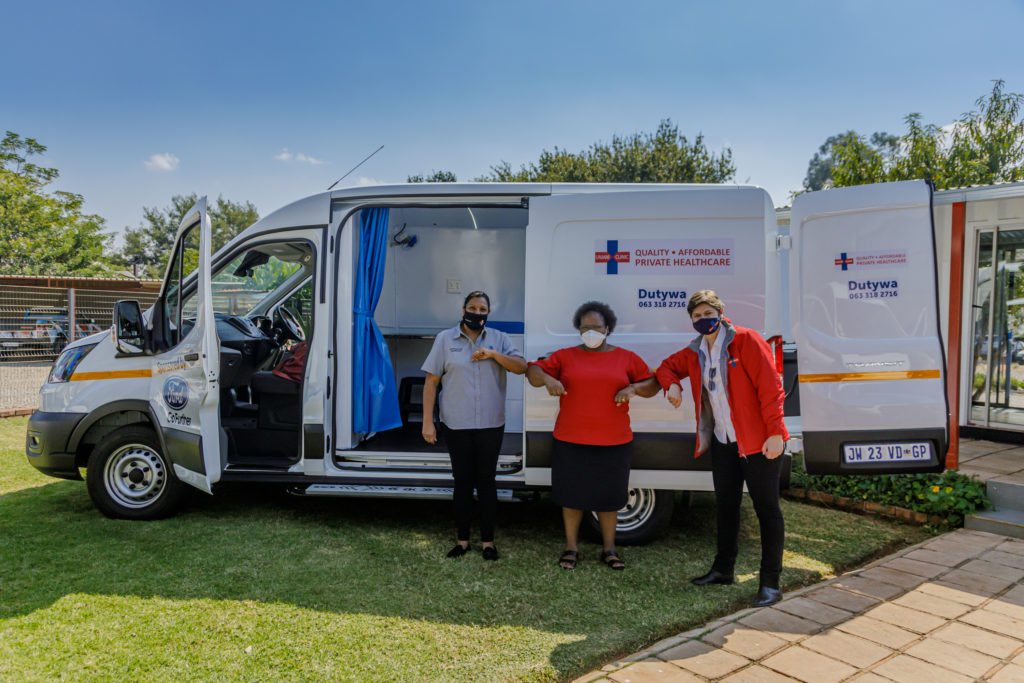
Ford South Africa has once again committed itself to uplifting and empowering communities by donating three vehicles to local non-profit organisations, which will be used to provide crucial assistance to impoverished communities.
Two Ford Transit panel vans, each valued at over R578 000, have been donated to Unjani Clinics — a local non-profit company (NPC) and public benefit organisation (PBO) – which will be used as mobile clinics, and will provide primary healthcare to an estimated 2 750 people in rural communities.
Additionally, Ford Motor Company Fund, the philanthropic arm of Ford Motor Company, has provided a R1.2-million grant to Unjani Clinics. The funds will be used to convert the vans into mobile clinics, train and employ two nurses and two assistants, and deploy the vehicles to enhance primary healthcare services in some of the country’s most rural areas.
Ford has also donated a Ranger 2.2 TDCi XL Double Cab, valued at R472 000, to Meals on Wheels Community Services, assisting the well-known welfare organisation provide food and other essential services to needy families.
“This past year has highlighted the critical need for more accessible healthcare and community support services across the country,” says Neale Hill, MD of FMCSA. “Access to mobile clinics has a significant impact on the wellbeing of rural communities where there is limited access to primary healthcare, and where people have to travel long distances to access the most basic healthcare services.
“We are delighted to be able to empower Unjani Clinics by donating the two versatile and capable Transit vans, and also funding the conversion of the vehicles and the running of the mobile clinics project through the Ford Fund,” Hill says.
“Similarly, Meals on Wheels has been assisting impoverished families and communities in South Africa for many years. We are proud to be supporting its crucial work with our locally assembled Ford Ranger to mitigate the dire situation many people face across the country due to the tough economic climate, as well as the large number of job losses and health issues resulting from the COVID-19 pandemic,” Hill states.
“This truly lives up to the Ford philosophy of changing and improving peoples’ lives, and we commend Unjani Clinics and Meals on Wheels for their unwavering commitment to caring for the most vulnerable members of our country.”
Unjani Clinics is an enterprise development initiative that focuses on empowering local health workers – particularly black female nurses – by creating permanent jobs and developing a sustainable clinic model for providing primary healthcare to communities across the country. There are currently 81 clinics in the Unjani Clinic Network nationwide.
“We are extremely grateful to Ford for supporting our mobile clinics project through the donation of these amazing vehicles, as well as the Ford Fund grant to convert the vehicles,” says Lynda Toussaint, CEO of Unjani Clinics. “This will allow us to provide a mobile clinic service as an extension of our existing Unjani Clinic Network, thus further enhancing crucial access to primary healthcare in selected rural villages and communities surrounding the areas in which an Unjani Clinic has been established.
“Our focus is on providing affordable primary healthcare for the employed yet uninsured population of South Africa, which comprises approximately 10-million people,” Toussaint explains. “The Unjani Clinic Network assists the Department of Health clinics and hospitals through infrastructure strengthening, by relieving them of the patients that are able to pay something towards their healthcare. This frees up capacity at the constrained state facilities to deal with the unemployed and destitute portion of our population.”
The Meals on Wheels Community Services project was founded in East London in 1964, and currently has over 700 service points countrywide. More than 1 400 volunteers are involved with the organisation and Meals on Wheels delivers over 31-million meals annually – with this number expected to double over the next year, according to Yolandi Erasmus, fundraising manager at Meals on Wheels Community Services.
“The frail, the poor and children have been hardest hit by the socio-economic impact of COVID-19. The need really is severe and getting worse by the day. Many people are going without food for days on end. In fact, there is a very real possibility that more people will die of hunger than of COVID-19,” Erasmus explains. “We assist as many people as possible, but it just never seems to be enough, and we rely heavily on contributions from and goodwill of the public and business entities.
“We are exceptionally grateful for Ford’s generous donation of the Ranger, which will help us put food in the hands of those who need it most,” Erasmus says.
For more information on Unjani Clinics, visit: www.unjaniclinic.co.za
For more information on Meals on Wheels, visit: www.mow.org.za






